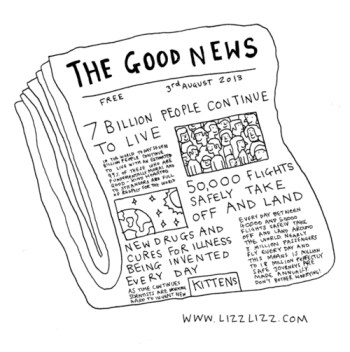[feature image via shutterstock]

HELLO and welcome to the 88th installment of Things I Read That I Love, wherein I share with you some of the longer-form journalism/essays I’ve read recently so that you can read them too and we can all know more about strong female characters! This “column” is less feminist/queer focused than the rest of the site because when something is feminist/queer focused, I put it on the rest of the site. Here is where the other things are.
The title of this feature is inspired by the title of Emily Gould’s tumblr, Things I Ate That I Love.
Black is Beautiful: Why Black Dolls Matter (February 2013), by Lisa Hix for Collecters Weekly – A fascinating trip into doll-world discussing how hard it’s been historically difficult to find black dolls and the importance of black dolls for youth of color. There’s a black doll museum in Massachusetts! I wanna go there so bad! I found it especially interesting because my Mom actually did get me a lot of black dolls when I was growing up, specifically I think to make be a better human with a less normative idea of female beauty? We couldn’t have Barbies because patriarchy, but all my off-brand Barbies, known as “The Heart Family,” were black. I was sad that my Heart Family dolls weren’t in this article.
When Mom Has a Secret (May 2007), by Tara McKelvey for Marie Claire – For some reason I wanted to write out this title in all-caps, like as if I was presenting it in a dramatic voiceover for ABC Family. Anyhoo, it’s about Sara Jane Olson, a former member of the Symbionese Liberation Army who left the group and started over with a new name and identity and got married and had three daughters and then the feds tracked her down and put her in jail.
Why I Hate Strong Female Characters (August 2013), by Sophia McDougall for The New Statesman – “Sherlock Holmes gets to be brilliant, solitary, abrasive, Bohemian, whimsical, brave, sad, manipulative, neurotic, vain, untidy, fastidious, artistic, courteous, rude, a polymath genius. Female characters get to be Strong.”
Still, God Helps You (August 2013), by Melissa Pritchard for Wilson Quarterly – “Snatched from a marketplace in Sudan and sold into slavery at the age of six, William Mawwin became one of millions of people in the world enduring some form of involuntary servitude. This is his extraordinary story.”
Laguna (August 3013), by David Perez for The Rumpus – People keep dying. He moves to San Francisco and also to Chicago. There are funerals and drug overdoses, and best friends and weddings. I will be a lagoon. I am a Laguna. I will live my life as a Laguna. I will be a separate body of water next to the ocean of my affiliated.
Taken (August 2013), by Sarah Stillman for The New Yorker – I read about this situation in The New Jim Crow as well. The police department can pretty much steal all your shit whenever they want to and getting it back is nearly impossible if you’re a poor person: “[asset forfeiture] enables authorities to confiscate cash or property obtained through illicit means, and, in many states, funnel the proceeds directly into the fight against crime…. In general, you needn’t be found guilty to have your assets claimed by law enforcement; in some states, suspicion on a par with “probable cause” is sufficient. Nor must you be charged with a crime, or even be accused of one. Unlike criminal forfeiture, which requires that a person be convicted of an offense before his or her property is confiscated, civil forfeiture amounts to a lawsuit filed directly against a possession, regardless of its owner’s guilt or innocence.”
Kiese Laymon on Race & Writing (August 2013), by Akiba Solomon for Colorlines – This piece isn’t very long, so I don’t know that it counts as longform, but if you bought his book LIKE I TOLD YOU TO and have been reading his stuff that I’ve posted here, I think you would also like this interview!
Shatter My Heart (July 2013), by Lisa Wells for The Rumpus – “On July 20th, 2003, a tour van rolled on I-5 south of Portland, OR, killing three of my friends. They were members of power-pop band The Exploding Hearts, and I’m told their story is one of the biggest “what ifs” in punk rock. I don’t know if that’s true, but I can say for certain that it’s the biggest “what if” in the lives of those they left behind. Rock & roll, immortality, youth—whatever was shattered that day, this is what I keep.“
Steve Brill on Healthcare and the Media in America (March 2013), by Mike Webb for ProPublica – Remember that amazing TIME Magazine piece about how health care companies fuck with uninsured people and how everything is unfair and terrible? This is an interview about that piece but also about journalism in general, and has a lot of interesting things in it about writing.
The Poorest Rich Kids In The World (August 2013), by Sabrina Rubin Erdley for Rolling Stone – This article is just about waste upon waste upon waste, and children who should’ve “had it all” but instead were abused and neglected.








Comments
This is my favorite thing I look forward to it every week.
But main is that “I Hate Strong Female Characters” story every single thing I hate about that kind of journalism. First, the contrarian get your attention headline when the story is really about something else. Second, the completely out of context characters. She mentions Hamlet and Richard II as complex suggesting (by not mentioning the women) that there are no equivalents. But Shakespeare also brought us Cleopatra, Lady MacBeth, Rosalind, Hero, Cordelia all complicated, complex human beings who couldn’t be reduced to strong. (Note that it is Lady MacBeth who suffers complex feelings of guilt and conflict about what they have done, note that Cordelia could have made her noble points with more grace but she was as stubborn as her father, note that Cleopatra is fare more complex than Antony, note that Rosiland is essentially a perfect character not perfect in feminine ideal ways but in a fucking awesome character way.) Also, one of the more famous examples, Juliet was far more complex than Romeo with a far richer internal life (note that after one of the most famous soliloquies from that play “what light..” Juliet promptly says “don’t bull shit me with pretty words tell me what you think and feel” to paraphrase). In fact, English literature has a long history of strong, complex female characters.
She goes in depth about characters like Sherlock Holmes and doesn’t go into depth about corresponding female characters. The impression left is that there are none that are complex like Holmes but there are merely generically strong. Which is, of course, pure bull shit. Even the picture she has, of Buffy, is way more complex than just “strong” and way more complex than Sherlock Holmes. She responds to the turmoil of her life by growing increasingly withdrawn and angry like a person. Holmes is reset each time for each new mystery.
Her problem is that there aren’t enough female protagonists. And it should be 1:1. Fine. I completely agree. The disparity is disgusting. Make that point without manipulating the characters you represent to suggest there are never complex female characters. And that “strong female characters” is just a stock type.
oh man, this is an amazing takedown! i was totally unsure of how to feel about it — often when i just use a quote, it’s ’cause i have no actual statements to make on it yet? — i think you’re onto something
Yeah, I found it fairly weird that she focused on . . . Captain America? And other summer-blockbustery movies? Like, *of course* there are going to be an abundance of ass-kickin’ babes in those kinds of media because they are about action and fighting and world-saving and stuff. Absolutely it would be aggravating if these were the only female protagonists we ever got to see on our screens, but they aren’t, not by a long shot. If framed as a review of Captain America or a piece on gender representation in superhero movies, it would’ve made sense, but as it was it felt misguided.
I could swear there was a Bones episode based off of or inspired by Sara Jane Olson
The Soccer Mom in the Mini-Van!
i saw Strong Female Characters and was bewildered not to see Kate Beaton’s name:
http://harkavagrant.com/index.php?id=311
that was hilarious!!!!
Those poor rich kids. I wouldn’t wish that kind of wealth on my worst enemy.
It’s clear that I am on AS a lot that it is showing up in my dreams! This post is spooky in the best way because I had a dream that I was a little kid and I was playing with a little Riese with the epic bowl haircut and we were fighting over, yes, barbie dolls.
Clearly lesbian baby black jesus is telling something…. it’s like Field of Dreams but *whispers* “Go to A-camp..camp…camp…caaaaaamp.!”
I read the article about black dolls and it was absolutely fantastic! I was a cute ass baby, like fucking adorable ball of Nigerian sunshine. People bought me dolls and presents because I was so precious. Some of the fucked up parts were people didn’t think my mom gave birth to me thanks to colonization and colorist *sigh*. Anyway, I was looking back at my baby pictures of myself when I lived in Nigeria and and I only had white ass( white as snow, white) baby dolls. I was shocked looking back.
When I came to America I barely had dolls mainly had stuffed animals and nursery rhyme books. I never had black dolls just two that I did not have too much interest in. I never had an interest in dolls because the lack of reflection I saw in myself, no money and accepting the white supremacist mindset that would take me years (and I’m still a work in progress) dismantling. I didn’t want to give myself a color and now at my age I see the great cost of what I have done.
I buy black dolls for my little cousins who want them, I also love the Monster High doll collection because it also more or less neutralizes race too. It is fascinating seeing my cousin play with her Monster High and regular barbie dolls (of all shades). Her mind seems to almost switch between the dolls she plays with. I might be projecting though because feelings of little black girls matter, dammit!
Exploding Hearts! Oh god it was so sad when they died, their record is really awesome.